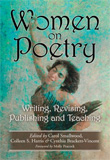Review by Erin Dorney
McFarland & Company, Inc.
Box 611
Jefferson, NC 28640
ISBN: 978-0-7864-6392-3
2012, 286 pp., $45.00
www.mcfarlandpub.com
Women on Poetry: Writing, Revising, Publishing and Teaching is an anthology of 59 essays edited by Carol Smallwood, Colleen S. Harris, and Cynthia Brackett-Vincent. Divided into four sections, with approximately 11-19 essays in each, the book has something to offer poets at all stages of their writing life. In the book’s forward, Molly Peacock states:
The anthology moves like light on water, brightness and shadows flickering and stimulating a brilliant palette of tones: provocative, quizzical, serene, amused, earnest, ironic, deadpan, innocent and wise.
Indeed, with over 40 contributors, there is something for every writer in this collection. The editors made an effort to obtain diverse representation from across the United States and abroad, with each contributor presenting crisp, concise articles of around 2,000 words each on a variety of topics.
Part I, titled “Our Writing Life–A Collective Voice,” features essays on the often heartbreaking art of revision, making time for writing, and tips for addressing taboo subjects like sexual abuse. A variety of essays share writing prompts and activities for both groups and individuals, along with benefits of attending writing conferences. One highlight was Jenny Sadre-Orafai’s “How to Write in Multiple Genres Successfully”:
Limiting our writing to one genre is safe but not smart if we hope to become better writers.
Sadre-Orafai offers a simple piece of advice but one that may often be glossed over in a writer’s enthusiasm to view herself as a poet only.
Part II, “We Who Pass It On–Tips on Teaching,” covers teaching poetry in the classroom, presenting at conferences, and innovative techniques for teaching grammar and ESL through poetry. Advice on running a writing workshop, how to jump-start a poem, and using line breaks effectively are presented with illustrative examples to help women build their craft. Bonnie J. Robinson’s “The Constituent Element Approach: Gender-Based Writing Prompts” explodes methods to help student writers negotiate socioeconomic issues and binary divisions of gender. Here, teachers will learn how to tailor prompts to their classroom audience in order to leverage existing circumstances, providing a link between students experience and the writing process.
Part III, titled “The Next Step–Publishing Our Poetry,” contains a number of essays detailing the importance and ease of building an online presence through personal websites, blogging, and social media (Facebook, Twitter). Preparing and submitting poems for print publication is covered, along with alternatives like video poetry, book reviewing, creating an online journal, and echapbooks. Carolyn A. Dahl provides candid advice for conference presenting, Kim Bridgford discusses the woman poet as entrepreneur, and Christina Lovin shares tips for securing funding for writing. Another highlight is Judith Skillman’s “Revising Your Poetry Manuscript for Theme.” Skillman’s advice and exercises will be helpful to poets wondering how to arrange disparate poems into a coherent manuscript for submission to a first book contest or publisher.
Although the entire anthology is written by and aimed towards women, the last section, “Just for Us– Essential Wisdom,” is specifically focused on women’s writing issues. Sharon Chmielarz interrogates issues of competition and friendship within writing relationships/groups. Other topics include lessons from the lesbian and feminist publishing movement, female empowerment, journaling, and the power of the everyday. Yelizaveta P. Renfro’s essay “Motherhood Poetry” references exercises and potential markets for women raising children. In her essay “Unique Issues Women Poets Must Overcome,” Linda Rodriguez points out stark data showing the gender inequalities of a male dominated world of publishing, stating: “What women poets do need is confidence–confidence in the validity of their own experience and style.”
The quality of writing throughout this anthology varies, but the gems are worth the digging. The collection is perfect for picking up during those off-minutes and snatches of time throughout the day, each essay brief enough to read through and reflect on without seeming daunting. Providing resources and exercises for poets at all stages (writing, revising, publishing, teaching), the book will excite readers, leading them down new avenues to develop and hone their craft. With the breadth of contributors ranging from emerging to experienced women writers, the anthology is poised to become a staple resource in any poets toolbox.